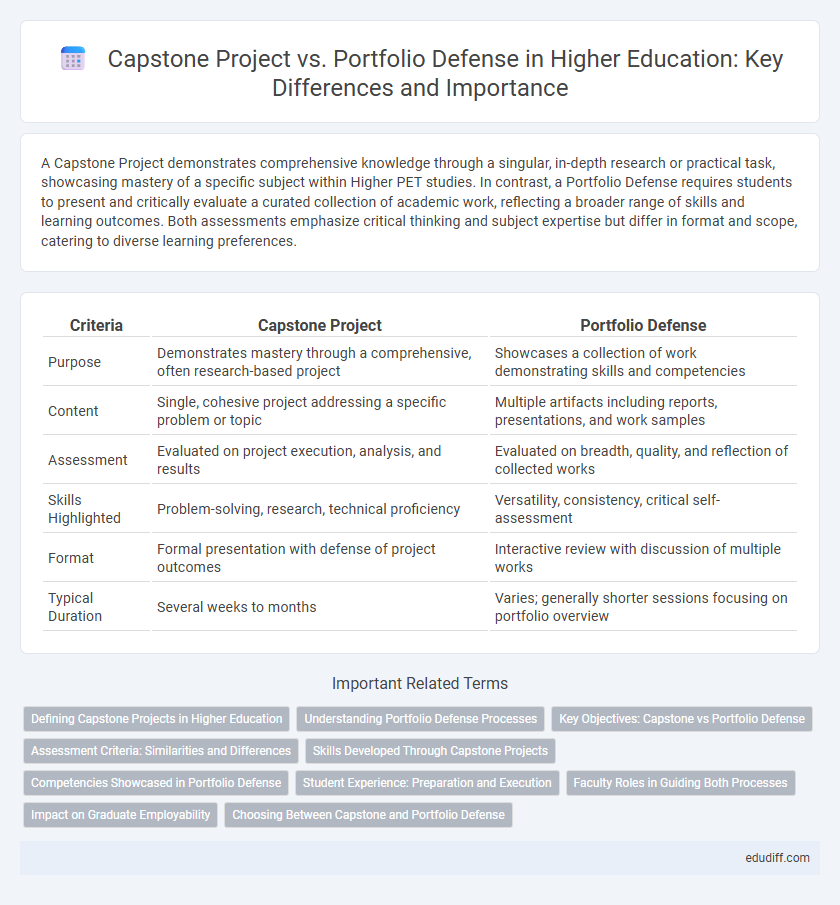A Capstone Project demonstrates comprehensive knowledge through a singular, in-depth research or practical task, showcasing mastery of a specific subject within Higher PET studies. In contrast, a Portfolio Defense requires students to present and critically evaluate a curated collection of academic work, reflecting a broader range of skills and learning outcomes. Both assessments emphasize critical thinking and subject expertise but differ in format and scope, catering to diverse learning preferences.
Table of Comparison
| Criteria | Capstone Project | Portfolio Defense |
|---|---|---|
| Purpose | Demonstrates mastery through a comprehensive, often research-based project | Showcases a collection of work demonstrating skills and competencies |
| Content | Single, cohesive project addressing a specific problem or topic | Multiple artifacts including reports, presentations, and work samples |
| Assessment | Evaluated on project execution, analysis, and results | Evaluated on breadth, quality, and reflection of collected works |
| Skills Highlighted | Problem-solving, research, technical proficiency | Versatility, consistency, critical self-assessment |
| Format | Formal presentation with defense of project outcomes | Interactive review with discussion of multiple works |
| Typical Duration | Several weeks to months | Varies; generally shorter sessions focusing on portfolio overview |
Defining Capstone Projects in Higher Education
Capstone projects in higher education serve as culminating academic experiences where students integrate knowledge and skills acquired throughout their coursework to solve real-world problems. These projects typically involve research, practical application, and interdisciplinary collaboration, demonstrating mastery of their field of study. Unlike portfolio defenses that showcase a collection of work, capstone projects emphasize comprehensive project development and critical thinking within a specific discipline.
Understanding Portfolio Defense Processes
Portfolio defense processes entail a comprehensive evaluation of accumulated work showcasing a student's learning trajectory, skills, and professional growth, emphasizing reflective analysis and contextual understanding. Unlike the Capstone Project, which centers on producing a singular, in-depth project addressing a specific problem, portfolio defense requires students to articulate the relevance and integration of diverse artifacts within their academic or professional domain. Effective portfolio defense preparation involves systematic organization of evidence, clear articulation of learning outcomes, and readiness for critical questioning by a review committee.
Key Objectives: Capstone vs Portfolio Defense
Capstone Project emphasizes comprehensive research, problem-solving, and real-world application of knowledge to demonstrate mastery in a specific field. Portfolio Defense focuses on showcasing a curated collection of work that highlights skills development, creativity, and growth over time. Both approaches aim to assess student competence, but the Capstone Project centers on a singular, in-depth project while Portfolio Defense evaluates cumulative achievements and reflective learning.
Assessment Criteria: Similarities and Differences
Both Capstone Project and Portfolio Defense emphasize critical assessment criteria such as demonstration of comprehensive knowledge, application of skills, and reflective learning outcomes. The Capstone Project typically prioritizes problem-solving abilities, project execution, and innovation, while Portfolio Defense focuses more on the breadth of work, consistency, and professional growth evidence. Both assessments require strong communication skills and critical thinking but diverge in evaluation style, with Capstone emphasizing project-based results and Portfolio Defense highlighting cumulative performance across multiple works.
Skills Developed Through Capstone Projects
Capstone projects develop critical skills such as problem-solving, research methodology, project management, and effective communication, which are essential for real-world applications. These projects require students to integrate interdisciplinary knowledge, fostering analytical thinking and innovation within their field of study. Hands-on experience in capstone projects enhances teamwork and leadership abilities, preparing students for professional challenges beyond academic settings.
Competencies Showcased in Portfolio Defense
Portfolio Defense showcases a diverse range of competencies including critical thinking, problem-solving, and effective communication through real-world project presentations. Unlike Capstone Projects that emphasize a singular comprehensive task, Portfolio Defense highlights continuous skill development across multiple disciplines and practical experiences. This approach demonstrates adaptability and a broad mastery of subject matter, essential for career readiness.
Student Experience: Preparation and Execution
Capstone Project preparation demands extensive research, critical thinking, and project management, enhancing students' problem-solving skills and deep subject comprehension. Portfolio Defense focuses on curating and articulating one's best work, promoting reflective practice and effective communication of personal growth and achievements. Execution of both experiences builds confidence, with Capstone emphasizing innovation delivery and Portfolio Defense showcasing a cohesive academic narrative.
Faculty Roles in Guiding Both Processes
Faculty members play a critical role in guiding students through both Capstone Projects and Portfolio Defenses by providing tailored mentorship, feedback, and assessment criteria that align with academic standards and industry expectations. In Capstone Projects, faculty facilitate research design, project development, and critical problem-solving, ensuring students apply theoretical knowledge in practical scenarios. During Portfolio Defenses, faculty assist students in curating comprehensive evidence of learning, honing presentation skills, and articulating the integration of competencies across their academic journey.
Impact on Graduate Employability
Capstone projects showcase a graduate's ability to apply theoretical knowledge to real-world problems, directly enhancing problem-solving skills sought by employers. Portfolio defenses provide tangible evidence of a candidate's skills and accomplishments, offering employers a comprehensive view of practical expertise. Both approaches significantly boost graduate employability by demonstrating readiness to contribute effectively in professional environments.
Choosing Between Capstone and Portfolio Defense
Choosing between a Capstone Project and Portfolio Defense depends on individual learning outcomes and career goals. A Capstone Project emphasizes comprehensive problem-solving skills through a singular, in-depth research or development task, ideal for students seeking expertise demonstration in a specific area. Conversely, a Portfolio Defense showcases a broad range of competencies and projects, making it suitable for those aiming to highlight versatility and a diverse skill set to potential employers or academic evaluators.
Capstone Project vs Portfolio Defense Infographic

 edudiff.com
edudiff.com